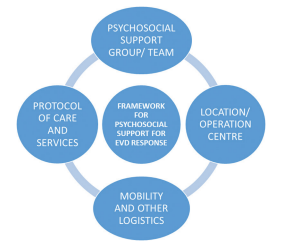Framework for a psychosocial support structure for individuals during an Ebola virus disease outbreak: Lessons from Port Harcourt experience
Main Article Content
Abstract
Background: The Ebola virus epidemic was reported in Lagos, Nigeria, in July 2014; this further spread to Nigeria’s Oil city of Port Harcourt in September 2014. Ebola virus disease (EVD) is highly infectious with high mortality rates reported. During such an outbreak, there is a tendency to neglect the psychosocial implications of this outbreak. This research sought to propose a psychosocial support framework during an EVD outbreak.
Methods: This study was a qualitative study. It employed review of literature, individual- and group-interview sessions and one of the author’s (CUO) experience and challenges as the lead of the psychosocial support group (PSG) during the 2014 EVD outbreak in Port Harcourt to develop a framework on psychosocial support for EVD. Data presentation involved tables, charts and GIS map.
Results: There were a total of four cases of EVD and 526 contacts in the EVD outbreak in Port Harcourt. The framework comprises four components, namely PSG, set-up/location, protocol of care and services and mobility/other logistics. A multidisciplinary team comprising psychiatrists, clinical psychologists, mental health nurses, counsellors, social workers and religious carers makes up the PSG. Set up/location refers to the PSG operation office. The protocol of care and services are the modalities of care related to the categories of individuals requiring psychosocial support in EVD response.
Conclusion: It is imperative that the psychosocial needs of individuals affected by EVD outbreak are sufficiently met. The psychosocial support framework provides a well-coordinated and structured approach in ensuring the holistic care of these individuals.
Downloads
Article Details
The journal grants the right to make small numbers of printed copies for their personal non-commercial use under Creative Commons Attribution-Noncommercial-Share Alike 3.0 Unported License.
References
1. World Health Organization. Nigeria is Now Free of Ebola Virus Transmission. Situation Assessment. World Health Organization; 2014. p. 20.
2. Shuaib F, Gunnala R, Musa EO, Mahoney FJ, Oguntimehin O, Nguku PM, et al. Ebola virus disease outbreak — Nigeria, July– September 2014. CDC Morb Mortal Wkly Rep 2014;68:867‑72.
3. International Federation of Red Cross and Red Cresecent Societies. Psychosocial Support During an Outbreak of Ebola Virus Disease. Brief Note Prep Psychosoc Support; 2014. p. 1.
4. Joachim C. Stress management for Expat working in Ebola Mission. Brief Paper Med Sans Frontiere 2014;1-15.
5. Paglia E. Psychological support during an Ebola outbreak in the Democratic Republic of the Congo. Intervention 2013:11:195‑8.
6. Matua GA, Wal DM. Living under the constant threat of Ebola: A phenomenological study of survivors and family caregivers during an ebola outbreak. J Nurs Res 2015;23:217‑24.
7. World Health Organization. Psychosocial Management. Ebola Marbg. Virus Disease epidemics Preparedness, Alert, Contol and Evaluation; 2014. p. 1. Available from: http://www.who.int/csr/disease/ebola/PACE_outbreaks_ebola_marburg_en.pdf. [Last accessed on 2015 Aug 10].
8. Shanahan F. Prioritizing psychosocial support for people affected by Ebola in Sierra Leone. In: Recommendations Ebola Recover. New York City: Pledging Conference; 2015. p. 1‑6.
9. World Health Organization. Ebola: Experimental Therapies and Rumoured Remedies. Ebola Situatuation Assessment. World Health Organization; 2014. p. 1.
10. Mbonye AK, Wamala JF, Nanyunja M, Opio A, Makumbi I, Aceng JR. Ebola viral hemorrhagic disease outbreak in West Africa‑Lessons from
Uganda. Afr Health Sci 2014;14:495‑501.
11. Abramowitz SA, McLean KE, McKune SL, Bardosh KL, Fallah M, Monger J, et al. Community‑centered responses to Ebola in Urban Liberia: The view from below. PLoS Neglected Trop Dis 2015;9:E0003706.
12. Health & Education Advice & Resource Team (HEART). Ebola Regional Lesson Learning. Report; 2014. p. 1.
13. National Population Commission. Census. Rivers State. Nigeria; 2006.
14. Assessment Capacities Project. Ebola Outbreak in West Africa, Lessons Learned from Quarantine‑Sierra Leone and Liberia. Report 6; 2015.
p. 1.
15. Morelli M, Cyrus G, WeissbeckerI, Kpangbai J, Mallow M, Leichner A, et al. Recovering from the Ebola crisis: Social Reconnection Groups’
in a rural Liberian community. Glob Ment Health (Camb) 2019;6:e17.
16. Ogoina D, Izibewule JH, Ogunleye A, Ederiane E, Anebonam U, Neni A, et al. The 2017 human monkeypox outbreak in Nigeria‑Report of outbreak experience and response in the Niger Delta University Teaching Hospital, Bayelsa State, Nigeria. PloS One 2019;14:e0214229.


